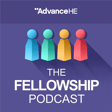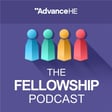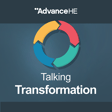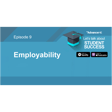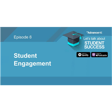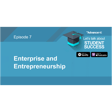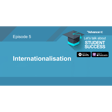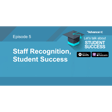Become a Creator today!Start creating today - Share your story with the world!
Start for free
00:00:00
00:00:01

Using reflection to evidence effective and inclusive practice for fellowship
This month, host Louise Lumsden is again joined by Raj Dhimar and Marita Grimwood to discuss how prospective Fellowship applicants can use reflection on their teaching practices to help produce the evidence needed for a successful Fellowship application.
Transcript
Introduction and Engagement
00:00:12
Speaker
Hello and welcome to episode three of our Fellowship podcast series. So that's hello from me, Louise Lumsden, Head of teach head of Fellowships Teaching and I'm delighted to be joined again by Raj.
00:00:25
Speaker
Hi everyone, it's Raj Deemar here, Fellowship and Awards Advisor at Advance HE. And Marita. Hi, it's Marita Grimwood, Senior Advisor for Teaching Fellowships. ah It's really nice that you've joined again today, Raj and Marita.
00:00:39
Speaker
um As a reminder to our listeners, you can get involved with our Fellowship Podcast series via the hashtag AHEFellowshipPod. So please do. and We'd love to hear from you.
Reflective Practice in Fellowship Applications
00:00:51
Speaker
In our last episode, we focused on senior fellowship and explored the key characteristics of the category Descriptor 3 of the Professional Standards Framework for Teaching and Supporting Learning.
00:01:02
Speaker
If you tuned in and listened, thank you. um And if you did, you may have been listening because you were thinking of applying for senior fellowship or you are currently developing an application for senior fellowship.
00:01:17
Speaker
Whichever the case, we hope that you're able to pick up some useful and helpful hints and tips to support your journey so far. For our next episode, this episode, we're going to focus on the reflective account of practice and how to present evidence and structure writing in an application.
00:01:36
Speaker
For each category of fellowship, and particularly for direct application to Advance HE, the structure of an application is a written application. For each of the categories there are specific requirements and you would need to look at the specific requirements for the particular category of fellowship that you are going to apply for.
00:02:01
Speaker
But it's generally called a reflective account of practice and across each of the guidance for Associate Fellow, Fellow, Senior Fellow and Principal Fellow.
00:02:13
Speaker
There is a simple reflective model to help and support the structure of writing. We are going to probably, I think, Raj and Marita, refer to this more broadly as we explore the reflective account of practice and how to structure writing.
Structuring Reflective Accounts Effectively
00:02:30
Speaker
But I just wondered if I can come to either of you. i don't know who wants to start, but just to think about your first thoughts. What advice would you give? You know, we're at the starting point and we've got our evidence and we've spoken already in our podcast about the planning and the generating of evidence.
00:02:46
Speaker
How do we start to go about writing?
00:02:51
Speaker
So I think um think if I could come in there, I think it's useful to keep in mind um what what this kind of reflective model can do for you and to keep the structure of it in mind and help use it to help you to structure your writing.
00:03:10
Speaker
So I think sometimes people get frustrated where they dive straight in and want to create a kind of perfect account straight off. I think it's often better if you think about how you're structuring it and just write to that structure and then work out later, um you know, maybe work out later how to turn it into something more, more kind of more flowing, like ah like a more story-like.
00:03:38
Speaker
So if you if you have a sense, if you're using this structure and you've got a sense of, what you did and why you did it and how you did it and how you know it works. and You keep coming back that. If you can almost start with bullet points, then that is a really solid foundation that you can use to check as you go along on how you do whether you're getting your message across.
00:04:03
Speaker
Yeah. Thank you, Marita, for starting off. Raj, what are your thoughts and starting points? yeah Yeah, I think because this is a really interesting one because I think if we kind of look at it from maybe its broadest perspective in in how I'm thinking about this, we're looking at something which is focused on really showing the effectiveness of of what an individual is doing in relation to any for the categories of fellowship that they're aiming to achieve.
00:04:33
Speaker
And in showing that effectiveness, reflection and its associated aspects are a really helpful way in which evidence can be considered, selected, articulated and refined in whatever format that might be required in for the particular category of fellowship. And so, you know, Merita is really helpfully kind of identified here that you don't need to jump in straight away, do you?
00:04:58
Speaker
you can take your time given that this is something that could be considered thought about um refined as much as you like until you're happy with it at a point in time for it to be good enough to to meet whatever aspect of the criteria for the relevant category group fellowship and i think we also link to that need to bear in mind that we're you know in an environment where lots of things are measured lots of things are calculated lots of things are reviewed and particularly around teaching where you know some of that is readily available within institutions and accessible to individuals to to use and work with.
00:05:34
Speaker
But whatever format evidence is presented in there will need to be a way in which individuals need to consider their examples and outcomes and evidence within that.
Demonstrating Impact and Effectiveness
00:05:47
Speaker
So whether that's in a narrative form written, whether that's in an audio form or in a dialogic form, there is some consideration of what that means and what it looks like and how it works and how it operates.
00:06:00
Speaker
um And that means adapting and reflecting on the evidence that's there for the relevant purposes. so I think when I think about conversations I've had, with applicants over many years, i think over the last 13 years.
00:06:13
Speaker
um you know, i get kind of conversations that focus on, okay, so I've got so many outputs in terms of my publications, or I've got X amount of citations, or I've got these amounts of things that I've created, or these are my roles.
00:06:29
Speaker
ah Will that do? Is that enough? And actually, it's not quite enough, because how you do something well in terms of showing the effectiveness then requires that wraparound of explanation sufficiently in order to be able to then think about the relevance of what Marita talked about with the rationale and the underpinning and the articulation of the explanation to show then the impact that it's had and the reflection approach really helps anyone who's thinking about that aspect in taking that forward so that's kind of my my starter really on that basis and considering reflection in its round and its broad aspect and tying it into the descriptor requirements and ah relevant categories of fellowship ah thank you raj and you touched upon there um thinking about
00:07:21
Speaker
the what you did and then what the output was and I think it's really important to think about the why and the how it happened because then you're enab you're enabling yourself to really look more closely at the dimensions I don't know if you want to come back at that or Marita perhaps wants to you know and thinking about a specific category for example Yeah, i think I think if you don't write with this kind of reflective, with some kind of reflective structure in mind, you will always undersell yourself. You'll you'll never really be able to fix late.
00:07:54
Speaker
um what you know why why was it poor Why what you did was important and what it achieved. And that ties into a number of the dimensions, I think, in terms of evaluation, which is you know critical evaluation, which is there in k three in terms of V3 where you're, you know, evidence-informed practice where that needs to, you know, you need to you need to make it make it clear what you've learned, you know, what thought your knowledge base is for what you're doing as well.
00:08:27
Speaker
um And if you just don't give that detail of how you went about things, um you know, we won't be able to see things like your collaboration, um how you are promoting engagement and learning. like Those things get lost along the way.
00:08:41
Speaker
So it is really, really important, I think. Yeah, I really do. Where are you with Descriptor 2, for example, and fellowship? So in terms of writing through and following through a structure to be able to demonstrate that depth and breadth?
00:08:59
Speaker
Yeah, so if we if we apply our kind of concept around reflection and um focus on this, Descriptor 2 is about having breadth and depth in relation to teaching and learning or supporting practice.
00:09:11
Speaker
And typically that might be across a range of services or a range of courses or programs or equivalent in ah in a HE context. And that breadth and depth of practice and showing how well that's done kind of really encompasses a ah kind of cyclical way of of working and operating and being that allows individuals not only to understand the choices that they make any one given point in time but where and how they might refine that so the professional recognition as part of the framework really provides the opportunity for individuals then to consider the choices that they're making around, say, what teaching approach they want to use for a particular module or course or service, and then how they would structure that for a particular set of learners at whatever level or whatever standard, and then how they would go about knowing that those activities underpinned by the relevant knowledge and applied in the relevant values
00:10:10
Speaker
have actually had a meaningful impact. And the key bit is about having meaningful impact for the audiences that you're working with. So in the case of D2, the audiences are predominantly going to be learners in whatever shape or form in in a higher education context.
00:10:24
Speaker
So it's about how you know that the things that have been designed or taught or assessed or supporting ah learners enabling those to succeed within their higher education studies or or programs or courses or equivalent and then enabling that to be handled in a way that can then also inform changes to practice, thinking about teaching and learning as a kind of organic thing, not organic thing, but as a emerging thing that continually evolves, um both in terms of subject or discipline or area of practice, as well as what an individual would do. So that involvement of work is really about getting to grips with where and how then that information can be sourced.
00:11:09
Speaker
And There are so many choices that could be made at any one point in time. Being clear about why you choose one approach over another is what's really important as part of an articulation and an example to then show the value of that.
00:11:24
Speaker
And I think if I try and bring this to life and in an example for, say, A2, teaching and supporting learning, There may be various things that have happened, for example, you know delivery of seminars or lectures or tutorials or simulation or wherever it might be.
00:11:39
Speaker
But then through cyclical review, for example, through quality assurance systems and evaluations, that raised issues from learners about perhaps the assessment not quite working or the approach of a particular method didn't quite hit the mark.
00:11:53
Speaker
um And so you consider that and youve you refine it and enhance it say, what can I do that could be better and why might it be better? And you spend time, um appropriate time as proportionate to whatever you're teaching or whatever you're supporting and learning to modify that and put that in place in subsequent years, for example.
00:12:13
Speaker
And then hopefully that will triangulate in terms of making things better for you as ah as a teacher as a practitioner or as a as a higher education professional, but importantly, making it making it better for the learners as well. And you can show that trajectory of of traction, of impact.
00:12:30
Speaker
And that impact can be demonstrated in a multitude of ways. And, you know, wed we'd suggest certainly that individuals think about the multitude of ways that they can show that impact.
00:12:41
Speaker
through the reflections that they consider, and be that qualitative, be that quantitative or a mixture, not to over rely on ah particular source like a survey approach or testimonials as the only way to show how things have been valued. So these are all really important aspects of of a kind of cyclical way of considering things that are all meaningfully enabling people to understand the value of the work that they do triangulated with the evidence that's used to to demonstrate the impact along with any endorsements that might come from referees supporting statements etc.
00:13:16
Speaker
Yeah I think also thank you for sharing those examples as well I think you know that's really helpful because it brings to life the the elements of this process of thinking about your practice and experience and Marita we've spoken haven't we about that and gathering that experience and building on the experience and also how that's linked to the descriptor criteria.
00:13:40
Speaker
Yeah, I mean, I think it it sounds, you put it, what you say there about using the using the reflective model to link to the requirements of the descriptor sounds so straightforward.
00:13:51
Speaker
But we see so there are so many cases where people just don't don't do that. They struggle to do it. um And I think there are different different reasons for this.
00:14:02
Speaker
I work a lot with D4 and Principal Fellowship. And one of the things that we see a lot there is that people will be addressing, they will not being they will not be focused on the descriptor very well at all parts of the reflective um reflective cycle, if you want to call it that, or at all stages of that account, you know where you're talking about your rationale and what you did and how you did it.
00:14:28
Speaker
and how you know it works. So for example, they might sort of talk about, um you know, you might you might see that they've um they've done something which has had really impressive influence and impact on student learning across, maybe across the whole university.
00:14:43
Speaker
But then what they will write about, what they will reflect on the how is more about just what they did within their school, which might be how it all started, but it's not really the story they need to be telling for for that descriptor for D4.
00:14:58
Speaker
And equally, the same problem often comes up with the evidence. So they will, you know, you need to show that evidence of that impact on a broad scale, and they may not actually provide that. So they may have described their leadership beautifully. and You're thinking, oh, yes, this is fantastic. We're going to, you know, this is going to be a really good application.
00:15:21
Speaker
And then the indicators of impact that they're using are not about that impact on the university scale. They're not about those changes to, for example, student retention or student attainment or your awarding gap on that institutional level. So i think it's think it's absolutely right tying it all back into the descriptor all the way along. And if you're using this structure, it just gives you some really useful questions to ask yourself.
00:15:53
Speaker
check in with yourself as you're going along to check that you are doing that. You are doing that rigorously. ah Thank you. and And, you know, some lovely examples there to demonstrate, ah well, examples of evidence. So, you know, thank you for sharing those, Marita.
00:16:10
Speaker
Raj, the prompt questions in the guide to the PSF 2023 dimensions are particularly useful, aren't they? if If we think about, um in it's in section four, and that's where the simple reflective model is. And the final piece of that is um how you evaluated the effectiveness and what changes you made as a result. And we've got some really fabulous prompt questions, haven't we, Raj, in the guide to the PSF dimensions documents that um applicants can use?
00:16:40
Speaker
but Yeah, we we do. you know And ultimately, it's about framing. It's about how people can articulate their work in a way where people that don't know them as part of an assessment panel review panel can understand the professionism and the identity of the individual that's making an application, the approach that's been taken and the rationale for the work.
00:17:03
Speaker
how that was underpinned and the value of that to the relevant audiences accordingly to the category fellowship that's being applied for so there is ah a logic and a structure it's not completely open-ended in terms of how things are framed and it's got a purpose to it so that what that might mean is that some of the things that you're thinking about in in terms of including might need to be adapted in terms of the evidence or the outputs have been created initially because we're looking at teaching and learning here in terms of the purposes of the professional standards framework in our education but that can be quite an exciting way of of packaging things accordingly because you're making decisions about what to include what not to include and why and the relevance of that so those prompts um either in those guidance or an equivalent reflective approach that might be from your discipline or subject or service are equally valid and relevant and asking those self-reflective questions about how you know that what you're doing is working
00:17:56
Speaker
And it may be that for some things, those aspects of the application of the evaluation is readily available. internally or externally or wherever they might be sourced from in other instances they might not be readily available and they might need to be sought out and you need to kind of create to a kind of balancing act of that awareness which then mixes the different types of ways in which you can show how what you've done is worked and when i'm particularly working with applicants um sometimes i just kind of change things around a little bit in conversations to to ask them about
00:18:28
Speaker
what they've changed in their practice to make things better and use that as a starting point. Because actually then that triggers the reasons for change to provide a model of of of enhancement, which is what's being sought after in terms of going beyond a description of i do X, I do Y, I do Z, which tends to be a risk that some applicants fall into the trap, or because it's easy to regurgitate a job description or set of roles or responsibilities.
00:18:54
Speaker
It's more challenging to think about then why things have been changed or modified, particularly if they were something that you agreed yourself or with others in the first place, maybe a few years ago. But I think the sector has now changed or the context is now changing our education. So this is really about valuing and considering effectiveness that's relevant and proportionate to what it's doing. And I think linked to that as well, I know we've said a lot about reflection.
Concise Writing and Learning from Experiences
00:19:24
Speaker
it's about it being appropriate to the example that's being provided, remembering the parameters of an application, whatever format that might be written or dialogue or otherwise. So for example, a case in point, ah let's use SF. SF is a 6,000 word reflective narrative.
00:19:40
Speaker
So actually those parameters create triggers for individuals to think about, okay, I've not got a huge amount here. And if I've been practicing for 20, 25 years, 30 years, I'm not going to write about everything I do. But what i can do is select these key recent examples from the last four five years, for example,
00:19:58
Speaker
And I know the ways in which these have worked and how I know I can generate information to reflect about the values and the outcomes of that. um And those choices are really critical to enable individuals to have a focus and select what they're going to gonna write about.
00:20:15
Speaker
And equally as well, those reflections are integrated within ah the evidence of example. So I think in some cases, in other contexts, um examples of effectiveness or impact are separate. They might be like artifact or they might be a document or resource. And in some approaches, for example, in schemes, for example, you might have a portfolio approach where you submit proportion of artifacts, whatever, for consideration.
00:20:41
Speaker
and for a direct application, the entirety of the impact and evaluation and the reflection is within a single and um application, for example. So bearing in mind kind of what those considerations are for the format will really help as well to hone in on those particular choices and framing of them.
00:20:57
Speaker
And they they't need not be lengthy either. You know, it's it's concise reflections of the impact and effectiveness that might be a paragraph or too long, maybe slightly shorter. They don't have to be long. You're not writing a whole book.
00:21:09
Speaker
You're not writing a whole journal article or paper or anything equivalent. So bear that in mind, which means that it's all feasible it's possible to consider these things and i think marita you touched on this earlier as well which i think is important to reflect on is that there might be some things that haven't really worked or haven't been successful.
00:21:29
Speaker
And I think if you want to think about some of those things, that doesn't mean that you can't include those things, but it's about them, what you did to either change that around or turn that around or do something differently when it wasn't working. And those reflections, if they're going to be part of an example, then need to still demonstrate some kind of effectiveness and success and inclusivity as part of ah the framework and the requirements of the descriptor.
00:21:50
Speaker
Yeah, it's about it's about showing you've learned from and from what's what's what's what's gone wrong, i think. think I think one of the of the really important aspects of using this kind of reflective model is that it allows you to show that you are managing your own development, that you are able to learn from whatever sources of information you have available, whether that's your colleagues or students,
00:22:17
Speaker
whether that's the literature, whether that's your your own reflections on what has and hasn't worked and why and the feedback and the evidence you sought out.
00:22:30
Speaker
So yes, I think that can be that can be important, but it is in the context of a claim. you are claiming effective practice, so you have got to show that you are ultimately, that you know how to you know how to operate effectively.
00:22:45
Speaker
Exactly, Marie, to bring it back to that effective and inclusive practice, which is part of all of the descriptors, want to D4, so absolutely. um And Rad, you were talking about, what you know, alluded to the word counts, you gave an example of senior fellowship, and, you know, we can't write everything we do. And again, that goes back to good planning and good planning mechanisms.
00:23:09
Speaker
You know, we've got to adhere to specific word counts. And so, It is about writing that's succinct. And as Marita, you've just said about making the claim and using those those really i am strongest examples to really make the claim to put forward to be and professionally recognized.
00:23:27
Speaker
So I'm just going to throw out one question to you both. And our listeners won't be able to see your reactions, but we might hear them. So right you're writing, you know, you're writing and structuring an application.
00:23:38
Speaker
ah where Where do you sit on bullet points and lists? Oh, wait a minute, Marita. Excellent. Oh, no. um Yeah.
00:23:50
Speaker
I mean, if you're using bullet points or you're using lists, you're not going to be able to do yourself justice. Exactly. It's a reflective narrative, isn't Yeah.
00:24:01
Speaker
So you are not a bullet point or a list is not able to show your rationale for decision making. It's not able to really... blame challenges with, you know, maybe challenges in influencing other people. If you're talking about senior or principal fellowship, how, what you had to do to to get people on board with something, what you had to do to engage your students and and to help them to help them to learn if we're talking D2. And and
00:24:33
Speaker
it's not going to help. It's not going to help make that link. You can look at a list. in which you say what you did, but then if you don't explore the how and the what, when you are providing that evidence of impact, there won't be a clear link between the two. And so anyone reviewing your application will have more questions about it. Well put. Thank you very much, Marita.
00:24:58
Speaker
And um you know we're we're almost at the end of our um session today. Raj, you know what what would your top tip be about structuring an application If you were, you know, had one thing, what would you say?
00:25:15
Speaker
I think you know take time to consider practice and really celebrate what it is that you're doing and what you know is working well. It's a a great chance to consolidate practice accordingly, aligned to the category fellowship that you're you're applying for.
00:25:32
Speaker
And it's rare that we get the chance to do that frequently. um We get told kaf quite often from what needs to be improved or what needs to change or what needs to be modified and what needs to be next. But professional recognition is really that chance to take a stop of where you're at in your practice to identify those examples and to stage the structuring of an application. And so bullet points are actually perfectly fine to start off with. Yeah. There's nothing wrong with bullet points because people want to have ideas and but you know we want people to write or to to record something in a voiceover or whatever tool they want to use.
00:26:07
Speaker
And that's perfectly fine to capture ideas, particularly at the beginning, when you might have so many ideas that you want to write about and by all means, get everything down in some shape or form, be that 100 ideas that you've got.
00:26:18
Speaker
Ultimately, then there's a filtering process that happens after that, which is then when you start to expand and explain and justify the things that you're doing to kind of create that. And, you know, first drafts are never perfect or ideal, are they?
00:26:34
Speaker
and So this is really about kind of getting initial ideas down and then working through the the questions of the what and the how and the why and the so what, et cetera, and wrapping that around. And it also helps you decide what to include as well.
00:26:47
Speaker
So my, you know, my tip is just to take time, have conversations, get support if you can. And if you're not sure about what impact or effectiveness you've had to be able to reflect on that, find out or ask where you've got the means and ways to do so in order to do that. You know, we've touched on different audiences, like students peers and externals, et cetera.
00:27:07
Speaker
But there are many different ways in which that can be done as well. And, you know, it's possible to do with a kind of thought focused way ah to achieve recognition on that basis.
Resources and Upcoming Topics
00:27:19
Speaker
ah Well, thank you so much, Raj, for concluding. Hopefully those who are listening will have, you know, will go to the guidance section for look at the simple reflective model and that hopefully will help you to plan, structure,
00:27:35
Speaker
to provide your effective and an inclusive practice, what the impact of your work is and be able to make the claim for the category that you are applying for.
00:27:46
Speaker
And, you know, once again, thank you so much, Raj and Marita, for sharing those invaluable insights from your experience and helpful tips to structure writing to make the claim for one of the four categories.
00:27:59
Speaker
um There are, as as always, I'd really like to say, please looking at the app please look at the applicant guidance, look at the guide to the PSF dimensions and look at the prompt questions, you know, really help think about your practice, particularly at those moments of inspiration where you're just in need of just some further thoughts. I would always look and have those by your side whenever you are developing an application for one of the four categories.
00:28:28
Speaker
um Also, please do check out, we've mentioned our fellowship blogs before, please do have a look at those on the Advanced HE website because they are an excellent way of hearing about others.
00:28:41
Speaker
and how they went about developing an application. And some of them do really provide some ah you know extra hips hints and tips that you might resonate with and may may be helpful for you.
00:28:52
Speaker
And it's also about how they structure their application as well. So I really would encourage you to do that. And I think, Marita, would you be able to just say a few words about our next episode?
00:29:05
Speaker
I think that's going to be about episode four. So yes, over to you, Marita. Yeah, so next week next time we will be focusing on Principal Fellowship, Descriptive 4.
00:29:18
Speaker
um And today we've focused a lot about writing, which is great and applies across all categories. I would like to think next week, I think it's going to be a really good opportunity to discuss what makes you ready for a Principal Fellowship claim.
00:29:37
Speaker
And I think there are three there are three things we can think about. the Having the right kind of leadership, the right kind of so right kind of leadership practice, the right evidence of impact and picking the right moment to apply.
00:29:52
Speaker
so those are some of the things that we will be talking about. Rita, I think you have sent you know our listeners. They'll be really interested in that episode.
00:30:03
Speaker
um You've given us some really nice tastes of what to expect. And thank you so much. ah Well, please don't forget, um as always, to get involved with our year-long campaign, the Festival of Fellows, via the hashtag Festival of Fellowship. um And ah once again, thank you so much for listening. And as always, thank you to Raj and Marita.
00:30:26
Speaker
And bye, everyone. Thank you. Bye.
